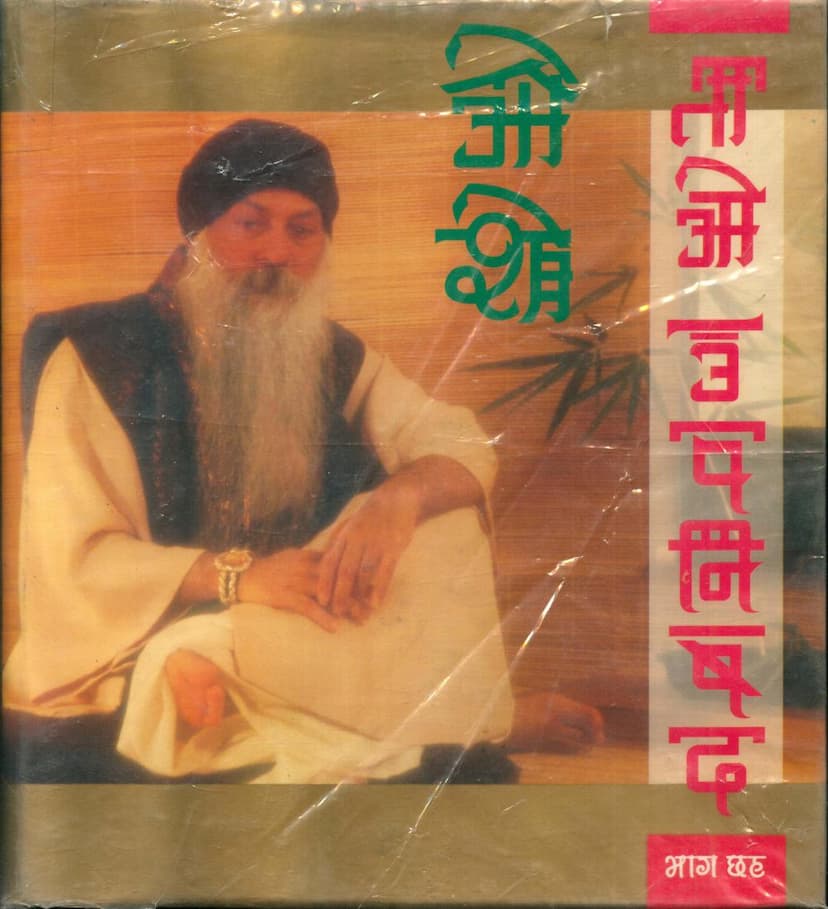Tao Upnishad Part 06
Added to library: September 2, 2025

Summary
Here's a comprehensive summary of the provided Jain text, "Tao Upnishad Part 06" by Osho Rajnish, based on the provided pages:
Book Title: Tao Upnishad Part 06 Author: Osho Rajnish Publisher: Rebel Publishing House, Pune Catalog Link: https://jainqq.org/explore/002376/1
This volume, "Tao Upnishad Part 06," is the final part of Osho's commentary on Lao Tzu's "Tao Te Ching," compiling the last 21 discourses (from 107 to 127).
Core Themes and Teachings:
The central focus of these discourses, particularly from Chapter 67 onwards, revolves around Lao Tzu's philosophy and Osho's interpretation of it, emphasizing a return to simplicity, naturalness, and the inherent wisdom within existence. Key themes include:
-
The Three Treasures of Lao Tzu: These are presented as the core of wisdom:
- Love: Through love, one becomes fearless.
- Not Too Much (Moderation): Through moderation, one attains amplitude and reserve power.
- Never Be the First: Through not presuming to be the first, one can develop and mature one's talents.
-
The Nature of True Knowledge vs. Worldly Knowledge: Osho contrasts genuine understanding, which arises from direct experience and stillness, with the accumulation of information and theories. Worldly knowledge, based on concepts and beliefs, creates a barrier to experiencing reality. True understanding is likened to darkness becoming familiar, making light seem blinding until one is accustomed to it. Similarly, worldly knowledge, based on past learning, prevents recognition of the divine if it appears in an unexpected form. The wise are often misunderstood as foolish by the ignorant because their wisdom transcends conventional understanding.
-
The Paradox of Greatness and Folly: Lao Tzu's teachings are described as resembling folly because they are "great." This greatness leads them to appear foolish to those who are bound by conventional logic and limited understanding. The profound is often paradoxical and beyond rational explanation.
-
The Danger of Intellectualism and Accumulation of Knowledge: The text critiques the tendency to accumulate knowledge (like scriptures, theories, and beliefs) rather than living experientially. This accumulation creates a barrier to direct perception and inner transformation. The wise, like Lao Tzu, emphasize that true knowing comes from shedding existing knowledge and becoming open, like a child.
-
The Importance of Simplicity and Naturalness: The discourses repeatedly highlight the beauty and wisdom found in simplicity and natural living, contrasting it with the complexity and artificiality created by human intellect and societal conditioning. Life's essence is simple, but the mind makes it complicated.
-
The Nature of the Sage and True Wisdom: The sage is portrayed as one who understands the paradoxes of existence, embraces humility, and acts without attachment to outcomes or recognition. They are like the water that nourishes all yet claims nothing, or the valley that receives all yet remains humble. The sage's wisdom is not about knowing more, but about "not knowing" in the ultimate sense, leading to a state of receptive wisdom.
-
The Illusion of the Ego and the Path to Freedom: The text delves into the nature of the ego as a construct that prevents true understanding and leads to suffering through comparison, ambition, and the desire for power. The path to freedom lies in dissolving the ego by embracing humility, non-contention, and a state of effortless being.
-
The Three Treasures (Revisited): The core teachings are reinforced through the exploration of Love, Moderation (Never Too Much), and Humility (Never Be the First). These are not merely philosophical concepts but are presented as fundamental principles for living a complete and liberated life. Love provides fearlessness, moderation provides inner amplitude, and humility allows for the natural unfolding of one's potential.
-
Critique of Societal Structures: The text critiques societal structures that promote competition, ambition, and the accumulation of power, arguing that these lead to internal conflict and alienation from one's true nature. True strength is found not in forceful assertion but in yielding, like water, which can overcome the hardest substances through persistence and adaptability.
-
The Paradox of Strength and Weakness: Lao Tzu's wisdom emphasizes that true strength lies in apparent weakness. The soft overcomes the hard, the gentle overcomes the rigid. This is exemplified by water, which is soft yet powerful enough to shape mountains. The sage, by appearing weak and humble, achieves true power and harmony.
-
The Importance of Inner Awareness and Presence: Throughout the discourses, there's a consistent emphasis on inner awareness, being present in the moment, and recognizing the inherent wisdom and potential within oneself, rather than seeking it externally through scriptures or prescribed rituals. The ultimate goal is to become one with the Tao, the natural flow of existence.
Overall Tone and Style:
Osho's commentary is characteristically insightful, often using stories, parables, and everyday analogies to illuminate Lao Tzu's profound and often paradoxical sayings. The tone is encouraging, inviting the reader to explore these teachings not as dogma but as a path for personal transformation and experiential realization. He challenges conventional thinking, urging listeners to question assumptions about knowledge, power, morality, and the nature of the self. The ultimate aim is to lead the seeker to a state of unburdened, natural being, in harmony with the Tao.